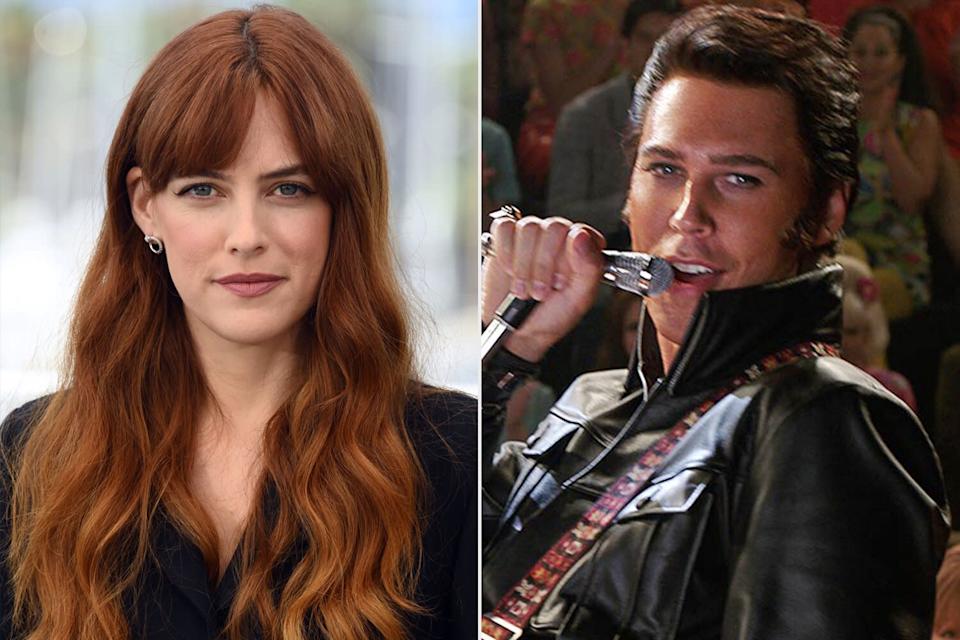

Baz Luhrmann has now made three generations of Presley women cry.
Riley Keough, the granddaughter of Elvis Presley, says the director’s upcoming film Elvis moved her to tears, just like it did her mother, Lisa Marie Presley, and grandmother Priscilla Presley.
The actress said the three women wept as they watched the film together as she spoke at Variety‘s Women in Motion panel at the Cannes Film Festival.
“It was a very emotional experience. It’s very intense to watch when it’s your family,” said Keough, a first-time director whose debut film, War Pony, premiered at Cannes. “It wasn’t like I distrusted Baz in any way, but you’re protective over your family.”


David Fisher/Shutterstock; Warner Bros. Pictures Elvis Presley’s granddaughter Riley Keough; Austin Butler as Elvis in ‘Elvis’
Elvis, starring Austin Butler as the titular singer, tells the story of Presley’s early life in Tennessee, his relationship with Colonel Parker (Tom Hanks), and his legendary rise to fame.
Earlier this month, his ex-wife Priscilla Presley took to Instagram to praise the film. “I’ve seen Elvis the film. I watched the trailer over a dozen times,” the 76-year-old wrote. “I relived every moment in this film. It took me a few days to overcome the emotions, as it did with Lisa.”
Lisa Marie Presley called the film “absolutely exquisite” and predicted it would win an Oscar.
Keough told the Cannes panel that she’s a longtime fan of Luhrmann’s.
“The first movie I ever watched in the theater and said I wanted to make movies was Moulin Rouge. I was 12,” she said. “It was a real honor to know Baz was doing this movie. Romeo + Juliet and Moulin Rouge, for the age I was at the time, were really powerful.”
She added that the effort Luhrmann and Butler devoted to getting the details right was obvious from the first moments of the movie. “That made me emotional immediately,” Keough said. “I started crying five minutes in and didn’t stop. There’s a lot of family trauma and generational trauma that started around then for our family. I felt honored they worked so hard to really get his essence, to feel his essence. Austin captured that so beautifully.”
Luhrmann told EW earlier this month that he wanted to use Elvis to spend time with the man rather than the icon, interrogating race relations and the shifting sands of celebrity culture along the way.
“This was about exploring America in the ’50 and the ’60s and the ’70s, and Elvis was at the center of culture for the good, the bad, and the ugly in various ways,” Luhrmann said. “It’s a bit like [how] Shakespeare takes a historical figure and uses it to look at a bigger picture.”
Luhrmann describes his film as less of a biopic or musical and more of an impressionist tapestry in his distinctive whirlwind style, told in three acts: Elvis the punk, Elvis the family-friendly movie star, and Elvis the ’70s jumpsuit fan.
“It’s a drama. But music in this film is as important as words,” Luhrmann said. “Because Elvis was a man of few words. When he spoke, he spoke with such intent and meaning, but where he really communicated himself was through song.”
The Australian auteur also said Butler was the perfect man for the job. “I put him through the ringer, but he lived Elvis. What he’s managed to do is not do an impersonation, but to live Elvis, to the extent that he’s humanized him.”
Elvis hits theaters June 24.
Want more movie news? Sign up for Entertainment Weekly‘s free newsletter to get the latest trailers, celebrity interviews, film reviews, and more.
Related content:




